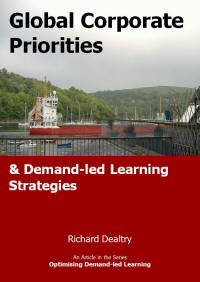Highlighting Strands to be Managed in Optimising Performance & Learning Return On Investment
The article takes a broad brush approach to a complex and large subject area that is influenced by many internal and external variables. It highlights two of the main strands to be managed in the dynamic process of seeking to optimise performance and return on investment in organizational based demand-led learning; learning that leads directly to decision making and resource allocation
Findings
There are many treatises on the subject of organization theory and practice and related platforms for change management. The condition of autopoesis, emphasising the dynamic of self production in shaping organization states, has featured prominently in these concepts and ideas of management. Indications are, however, that the demands and perturbations of the external environment are playing an increasing role in shaping organizations and the medium of learning is the catalyst by which means this trend is accelerating
Research limitations/implications
More empirical research into the effect of learning process innovations and behaviours on business performance and organizational capability development is required to put real foundation into what are being revealed about the benefits of learning in the workplace
Originality/value
Globalisation and Global competition is placing greater emphasis on: releasing talent at all levels, the need for innovations in the creation and fulfilment of learning opportunities and the effective and efficient management of the firms intellectual supply chain. The reactions at the learning supply-demand interface are changing and this article outlines perspectives that map the areas where relationships are changing as a basis for demand-led learning strategy formulation.
Click To View Abstracts From Our Articles Below
Research Reports:
- Frequently asked questions with reference to the corporate university
- Case research into corporate university developments
- Case research into the evolution of a corporate university development process
- Envisioning development
- ECUANET – European Corporate Academies Transnational Best Practice Network
- Interim reflections on the corporate university and SME academy business development innovation and its diffusion
- Moving towards optimising demand-led learning – the 2005-2007 ECUANET Leonardo Da Vinci project
Strategic Management:
- Strategic directions in the management of the corporate university paradigm
- Managing intellectual leadership in corporate value
- The real-time corporate university becomes a reality
- The savvy learner
- Integrating programme and process performance QA
- Global corporate priorities and demand-led strategies
Managing Design Parameters:
- Managing the corporate university learning curve
- Establishing a methodology for appraising the strategic potential of the corporate university
- Configuring the corporate university – managing a portfolio of thinking schools
- How to configure the corporate university for success
- Issues relating to learning accreditation in corporate university management
- Design and management of an organization’s lifelong learning curriculum
Best Practice Management:
- Engendering corporate scholarship for top level management performance
- Managing the transition to the corporate university – a synthesis of client research
- Managing the issue of learning relevance in the formulation of corporate learning strategies
- Managing the corporate university watershed
- The new generation of corporate universities – co-creating sustainable enterprise and business development solutions
- The corporate university’s role in managing an epoch in learning organization innovation
- Configuring the structure and administration of learning management
- Exploration of a contextual management framework for strategic learning alliances
- Hunting goodwill along the intellectual equity trail




